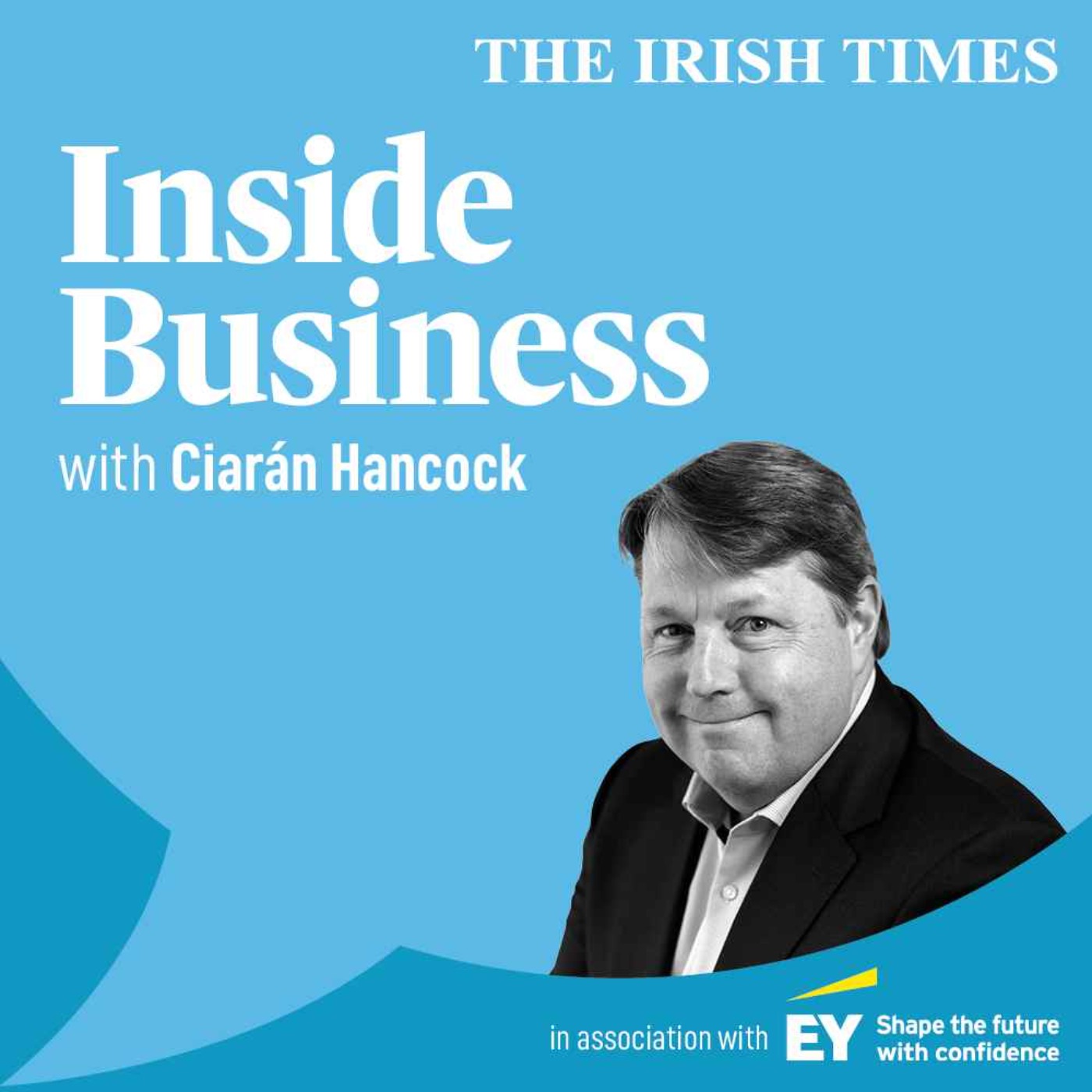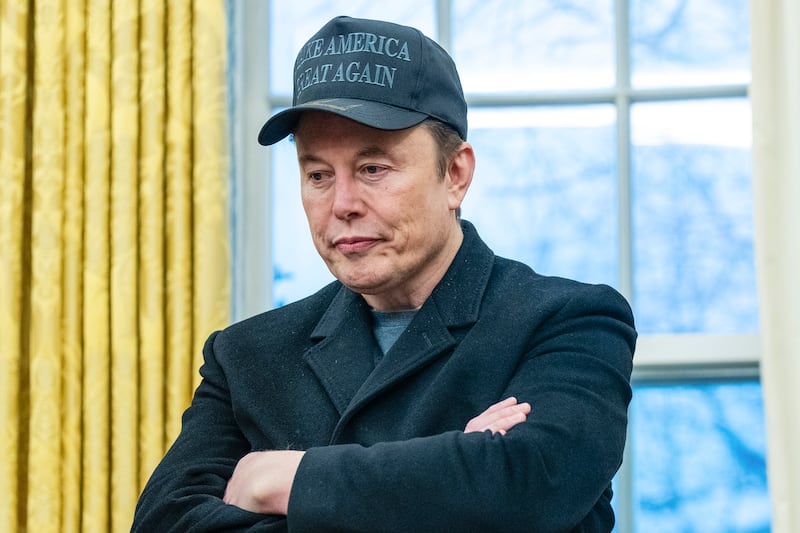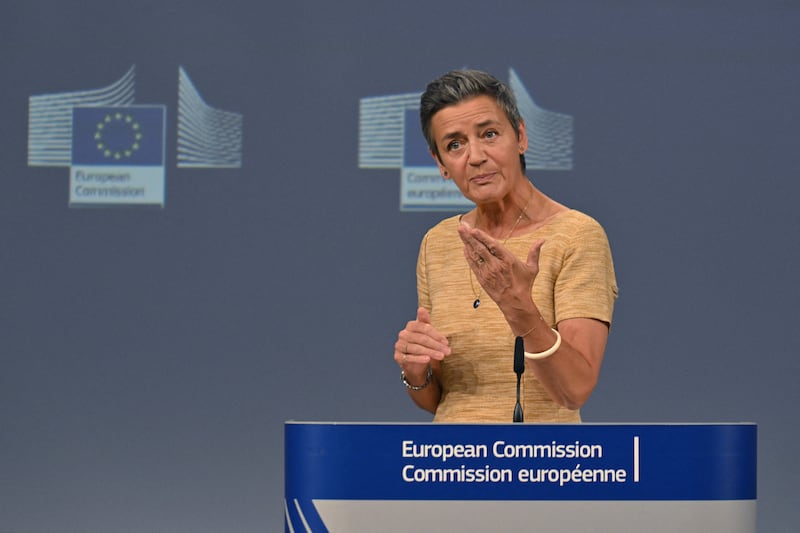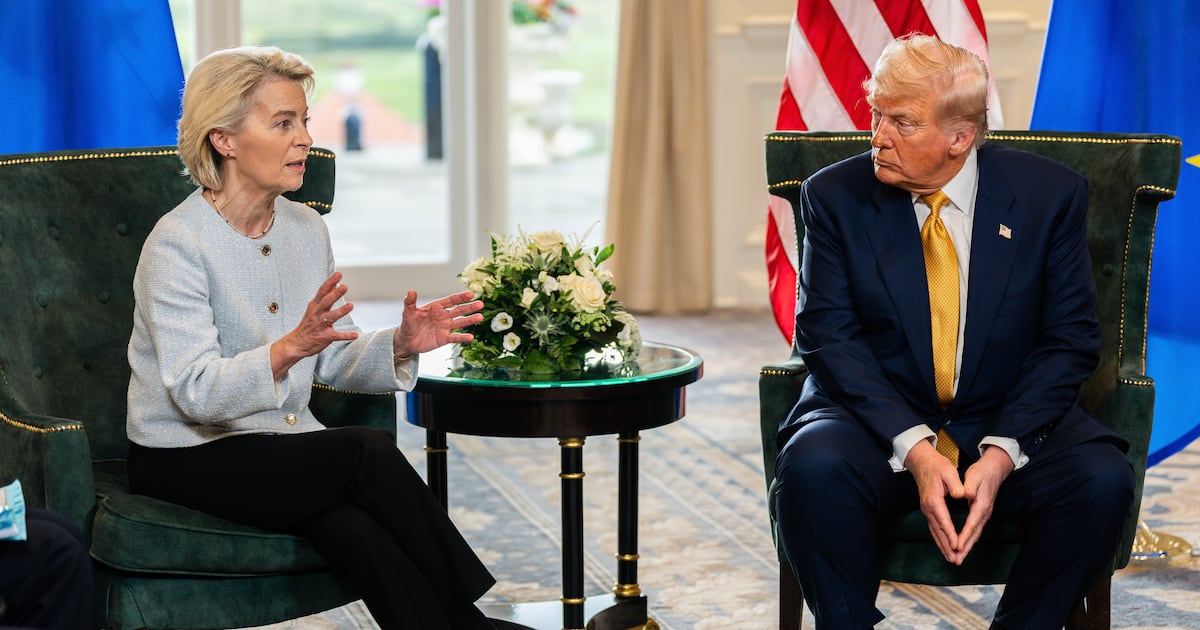Ursula von der Leyen’s new team of European commissioners were still unpacking boxes and settling into their offices in Brussels when the emails and letters began to land late last year.
Senior executives in Apple, Facebook-owner Meta, Google and other US tech giants were eager to make contact with several of the politicians stepping into influential roles at the top of the European Union’s powerful lawmaking body, the European Commission.
For years the relationship between Brussels regulators and US tech multinationals has been a tense one. This has often put Ireland in an awkward spot. As the European base of nearly all the US online and social media giants, the Republic is seen as having the back of Big Tech during policy debates inside the EU.
Silicon Valley executives are not fans of the EU’s digital rules which, among other things, attempt to rein in the amount of illegal, hate-fuelled content that ends up on people’s social-media feeds.
The laws give the European Commission power to levy billion-euro fines on big companies that seriously flout their obligations under the regulations.
This regime of digital laws has become the latest flashpoint in the fracturing transatlantic relationship.
Several months of painful negotiations ended with the EU accepting a one-sided deal where the 27-state bloc agreed to stomach 15 per cent tariffs on products sold into the US. In return US president Donald Trump dropped threats that he would put even higher import taxes on future trade coming from Europe.
Trump cast doubt on the reliability of that truce last week. Taking to his Truth Social platform, he threatened extra tariffs or export controls on countries that used digital regulations and taxes to “attack” US companies.
The threat ups the political ante of an ongoing commission investigation into X, formerly Twitter, which is expected to result in the EU fining tech entrepreneur Elon Musk’s company.
The fine would be the first handed down under the EU’s Digital Services Act (DSA).
The legislation came into force early last year. It puts obligations on social-media companies to remove illegal content and hate speech, protect underage users and make sure their platforms are not being manipulated to interfere in elections.
 Why is the delivery of vital infrastructure so slow in Ireland?
Why is the delivery of vital infrastructure so slow in Ireland?
The commission has made a preliminary finding that X breached the law. It said its new verification system, which allowed any account to purchase a “blue tick” – something that was previously reserved for public figures – was deceptive. It also found a lack of transparency around online advertising on the social-media platform.
X has pushed back hard against the commission’s findings in an extensive internal rebuttal. EU officials have spent more than a year shoring up their case, given that any financial penalty imposed on the company will certainly be appealed in the courts.
[ Tech regulations will be recurring tension point between Brussels and TrumpOpens in new window ]
It is understood officials inside the commission believe the EU body is likely to hand X a fine, probably in the range of several hundred million euro. That decision may be taken between now and the end of the year, and will possibly cause a clash between Brussels and the White House.
A second strand of the commission’s investigation is focusing on X enabling election interference, paring back its content moderation and its failure to take down illegal posts and images. Work on that inquiry is ongoing and unlikely to conclude for some time.
One source inside the commission said that case was broader and more political, but could carry a much heftier fine if X were found in breach on those counts.
 X owner Elon Musk. Photograph: Eric Lee/The New York Times
X owner Elon Musk. Photograph: Eric Lee/The New York Times
Von der Leyen has been accused of slow-walking a decision on whether to fine Musk’s company, for fear of antagonising Trump, initially during the tariff negotiations and more recently now that European leaders are trying to prevent Trump from taking Moscow’s side when fleshing out a possible peace settlement in the Ukraine war.
“We can see how the EU might be hesitant to sanction or introduce financial penalties on Elon Musk’s platform,” said Giorgos Verdi, a policy fellow at the European Council on Foreign Relations think tank.
Verdi, an expert on the geopolitics of tech policy, said Trump linking continued US support for Ukraine to concessions on the EU’s digital rules would be the “worst case scenario” for Brussels.
US negotiators seemed to have dropped their demands for movement on the digital laws in the later stages of talks to settle a deal on tariffs. Trump was tabling the issue again through the “side door”, Verdi said.
“It’s very obvious that Trump doesn’t like the EU’s digital regulations … He has been trying to water them down, or even repeal them,” he said.
[ Apple seeks ‘constructive and open dialogue’ with new EU competition chiefOpens in new window ]
The commission has been adamant that its digital legislation is not up for debate. The EU executive has also rejected claims that the laws amount to censorship of free speech, noting they require platforms only to remove illegal content.
One senior commission official involved in the tariff talks said the EU had been firm about not rolling back its digital laws. “We have made this clear throughout the negotiations,” the official said. “The European Union upholds its right to regulate.”
It was “very unlikely” the EU would cave and gut its new landmark digital rule book, said Verdi.
However, the Trump administration might be pushing for some sort of “grey zone”, where US companies would get to dodge any real sanctions or big financial penalties, he said.
Tech executives see Trump as the most direct avenue to push back against Europe’s online guardrails.
Meta chief executive Mark Zuckerberg has reportedly appealed to Trump to protect US firms from EU regulations and fines. Musk, who enjoyed a privileged position in Trump’s inner orbit at the start of his second term, before relations between the two men soured, has frequently bashed the EU’s regulations publicly.
“We have never had closer alignment between Big Tech and the US administration,” Verdi said.
US tech firms have been fighting with Brussels regulators for more than a decade.
 Former EU competition commissioner Margrethe Vestager
Former EU competition commissioner Margrethe Vestager
Margrethe Vestager, who held the EU competition chief post from 2014 until last year, became one of the most high-profile figures in the Berlaymont on the back of her battles with tech multinationals.
The liberal Danish politician used the EU’s state-aid and competition laws to go after companies that had enjoyed favourable tax deals or abused their dominant market positions.
Vestager’s biggest win came in the final weeks of her stint in the union’s executive body.
The European Court of Justice (ECJ) upheld a 2016 commission decision ordering Apple to pay €13 billion in back taxes to the Republic, drawing an end to the world’s largest ever antitrust case.
An extensive state-aid investigation by the commission found Apple had enjoyed favourable tax arrangements in the Republic between 2004 and 2014, massively reducing the amount of tax it paid on its European profits.
The iPhone maker and the Government had challenged the finding, initially winning a legal appeal in 2020, before the EU’s top court ultimately came down on the side of Vestager last year.
Internal correspondence released to The Irish Times shows US tech giants were eager to build up relationships with several of the new EU commissioners who sit around the top table with von der Leyen, when they took office at the end of 2024.
In a November 28th, 2024, letter, Google told Stéphane Séjourné, the incoming EU commissioner for industry, it remained “deeply committed to Europe”. The letter called for the “right set of enabling policies” to allow technology foster “innovation, security, and resilience”.
Apple similarly wrote to Teresa Ribera, the EU’s new competition chief, on January 9th, saying the company hoped to have a “constructive and open dialogue” with the commissioner on competition matters.
 EU commissioner for justice and democracy Michael McGrath. Photograph: Thierry Monasse/Getty Images
EU commissioner for justice and democracy Michael McGrath. Photograph: Thierry Monasse/Getty Images
EU commissioner for justice and democracy Michael McGrath also received letters of congratulations from Google, Meta and Amazon. All were eager to arrange sit-downs with their senior executives and the former Irish finance minister.
The Fianna Fáil politician is charged with introducing new legislation, the Digital Fairness Act, to regulate social media influencers and addictive tricks used by platforms to keep people scrolling.
That draft legislation has not been published yet. The scope of the new law is very much in the crosshairs of tech firm lobbyists, making it another front where Brussels and Washington could be set to clash in the coming months.
Efforts by US multinationals to shape EU laws as they are being crafted are nothing new. The big companies have well-oiled, multi-million-euro lobbying operations in Brussels to influence policy as it is being hammered out.
Meta spent at least €10 million on its Brussels lobbying operation last year, according to annual filings it is required to submit to a transparency register.
Apple spent between €7 million and €8 million last year. Amazon also reported spending between €7 million and €8 million on lobbying activities, with Microsoft estimating it spent in the same range.
[ Can Europe break free of American tech supremacy?Opens in new window ]
When Musk bought Twitter and rebranded the company as X he gutted its Brussels lobbying arm. Last available disclosures from the company reported it spent less than €200,000 in 2023.
How the bloc planned to enforce its new digital rules was raised in every meeting EU tech commissioner Henna Virkkunen had with top executives from Apple, Meta and Google during a trip to San Francisco in May, notes of those discussions show.
There are early signs that pressure from the US administration is causing the EU to pull its punches.
Ribera, the competition chief, had this week been expected to hit Google with an antitrust fine, for distorting the market by favouring its advertising services over rivals.
The left-wing Spanish politician has been the most vocal counterweight to von der Leyen’s caution at the top of the commission, with Ribera favouring a more assertive line.
However, the decision to fine Google was reportedly delayed as other figures in the commission feared it would set Trump off.
A spokeswoman for the commission sought to play down talk of the delay. “At this stage the [Google] investigation continues to be ongoing and we would not be commenting further on it … The investigation is concluded once the decision is adopted, no decision has been adopted,” she said.
Fianna Fáil MEP Barry Andrews believes the EU has given up too much ground in response to threats from the US president.
[ EU will not be deterred by US criticism of tech firm regulation, says McGrathOpens in new window ]
“We’ve got to a point where there has been one concession after the other made. Each one has been trousered and then something else sought,” he said. “It begins to look like appeasement.”
The EU should seriously consider turning to its nuclear option, the anti-coercion instrument, to fight back against Trump’s latest attempt at intimidation, the Dublin MEP said.
The instrument, known as the “big bazooka”, would give the commission wide-ranging powers. They would include the option of restricting US companies’ ability to bid on public contracts in the union, levy taxes on the digital advertising revenues of tech firms, and other measures that would hinder their European operations.
A months-long investigation would have to first establish that the EU was facing economic coercion from the US, before the commission could use those emergency powers. Triggering such an investigation would be seen as a big escalation.
European leaders didn’t reach for the bazooka during the fractious negotiations on tariffs over the summer months, despite pressure from France to do so.
A decision was taken that a lopsided deal favouring the US was better than the chaos of a trade war, even if Trump may have been forced to back down in the end.
The Government, which had been the most vocal in calling for restraint during the tariff dispute, needed to rethink its strategy, Andrews said. “We’re just going to keep getting steamrollered unless we stand up to the US.”
The EU should at least threaten to use its emergency powers, to head off any attempt by Trump to unpick the union’s tech regulations, he said.
The Republic could find itself pulled into the middle of a EU-US fight, as the host of most tech giants’ European headquarters.
Coimisiún na Meán is responsible for enforcing parts of the DSA at national level. The Irish online regulator is conducting a preliminary review into how difficult it is for users to flag illegal content on Meta, X and other platforms.
That review is expected to conclude in the coming months. At that point the regulator may decide to open its own investigations into whether US firms breached the EU rules, which could lead to fines further down the road. The Government probably won’t welcome the attention, or retaliation, that might draw from the White House.
